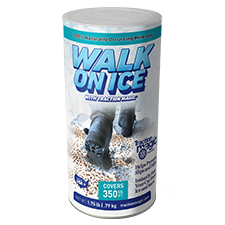Is Limestone As A Construction Material Good For Your Driveway – Pros And Cons
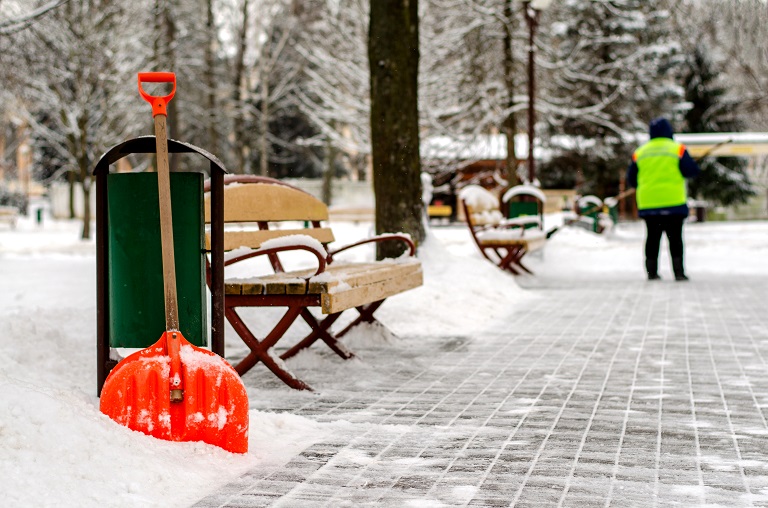
Limestone has become a popular construction material for driveways due to its durability and ease of installation. It is a sedimentary rock that is composed of calcium carbonate fossils. Limestone is formed by the accumulation of marine organisms and then consolidated over time into sediments, which were subsequently cemented together. Calcium carbonate is the main component of limestone and can be mined from mines in many parts of the world. In this article, we will discuss some pros and cons of using limestone for driveways and the best ice melt for limestone.
Understanding the Uses of Limestone
Limestone, a sedimentary rock composed mainly of calcium carbonate, has a wide range of applications in construction and landscaping. One of its primary uses is for creating durable and visually appealing driveways. Here are some key benefits of using limestone for driveways:
- Durability: Limestone for driveways is a robust and long-lasting material, making it an excellent choice for driveways. It can withstand heavy loads without cracking or breaking, making it ideal for vehicles and foot traffic.
- Aesthetic Appeal: Limestone driveways have a natural, elegant appearance. Their light color and texture can complement various architectural styles and landscaping designs, enhancing your property’s curb appeal.
- Cost-Effective: Compared to some other driveway materials, limestone for driveways is often more budget-friendly. It offers a high level of value for its cost, especially considering its durability.
- Low Maintenance: Maintaining limestone driveways is relatively simple. Regular sweeping and occasional regrading can keep it in excellent condition.
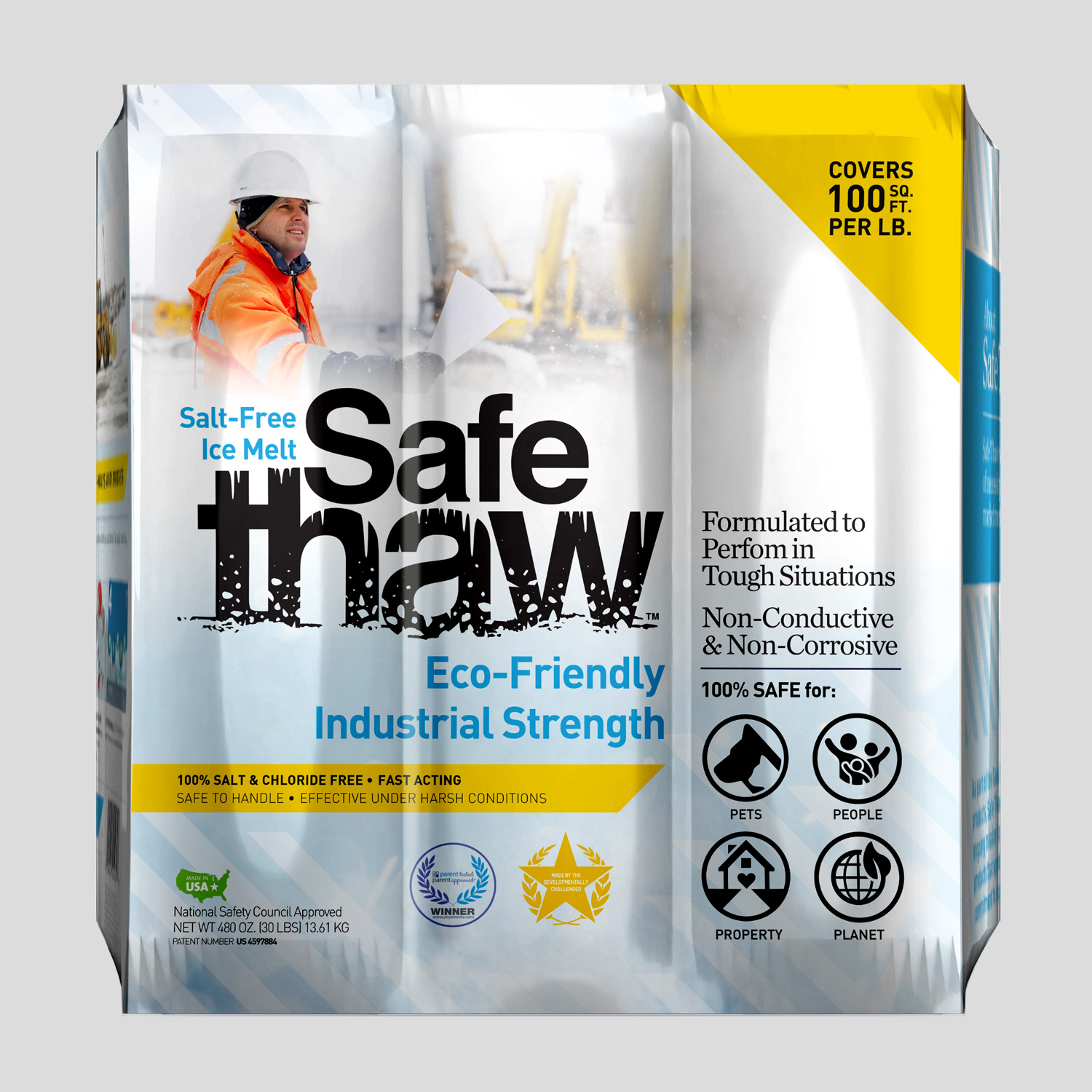
Safe Thaw
Safe Thaw was created as the ice management solution for tough winter environments. Ideal in commercial and industrial properties, shops, government agencies, bridges, and construction.
What Is the Best Base for a Driveway?
The base of your driveway is a critical factor in its longevity and performance. For driveways, a well-prepared and properly compacted base is essential. Here are some common base materials used for driveways:
- Crushed Stone: Crushed stone, such as limestone or granite, is a popular choice for creating a solid and stable driveway base.
- Gravel: Gravel is cost-effective and can serve as an excellent base material when properly compacted.
- Limestone: Limestone itself can also be used as a base material for driveways, especially when crushed into smaller sizes.
The choice of the best base material depends on factors like soil type, local climate, and your budget. Consult with a professional to determine the most suitable option for your driveway project.
Protecting Your Limestone Driveway in Winter
Winter weather can be tough on driveways, including those made of limestone. Snow and ice accumulation can lead to slippery and potentially hazardous conditions. While it’s tempting to use traditional salt-based ice melters, they can harm your limestone driveway and surrounding vegetation.
Safe Thaw offers a safer and more effective alternative. This chloride-free ice melt is designed to be gentle on your driveway while effectively melting ice and snow. It’s also safe for pets and the environment, making it an excellent choice for environmentally conscious homeowners.
Best Ice Melt For Limestone Driveway
Ice melts can be hazardous, especially when they contain harmful chemicals such as chloride. If you have a limestone driveway, you can skip the chemicals and use Safe Thaw instead. This ice melt is free from any toxic ingredients, so it will not damage the surface of your driveway. It is considered the best ice melt for thick ice and is safe to use around kids and pets.
100% salt & chloride-free, fast acting Ice Management Solution
Pros Of Having A Limestone Driveway
- Can withstand heavy loads: Limestone is a strong, durable, and heat-resistant material. When subjected to heavy loads and high temperatures, it does not crack or crumble easily. The following are some of the reasons why you should consider using limestone for your driveway:
- Highly resistant to weathering: Limestone pavers are highly resistant to weathering due to their high tannin content. They are perfect for areas that experience heavy downpours or snowfall. Limestone is a sedimentary rock composed of calcium carbonate fossils, which means it can last longer than other types of paving materials such as granite and concrete.
- Can withstand frost-freezing cycles: Limestone can withstand frost-freezing cycles without chipping off if properly installed with adequate support underneath it during installation.
- Soil Stabilization: Lime can improve the stability of the soil beneath your driveway, reducing the risk of settling or uneven surfaces.
- Added Durability: Mixing lime with other materials, such as gravel, can increase the driveway’s overall strength and resilience.
However, it’s important to note that lime is not the same as limestone. Lime is typically used in the form of lime powder or quicklime and should be applied carefully following expert recommendations.
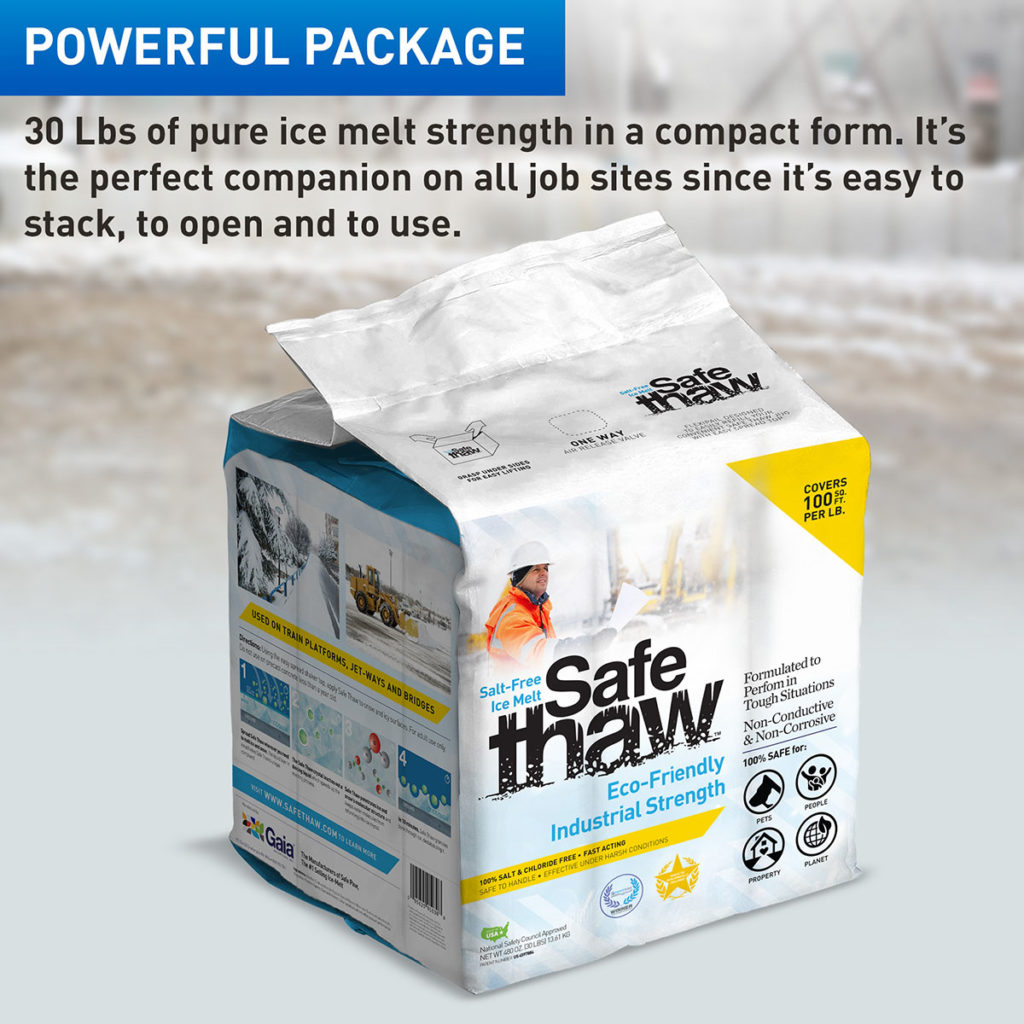
Safe Thaw
Safe Thaw was created as the ice management solution for tough winter environments. Ideal in commercial and industrial properties, shops, government agencies, bridges, and construction.
Cons Of Having A Limestone Driveway
As with any material, it’s worth considering the disadvantages of using limestone for your driveway. While many people love its natural beauty and durability, it has some drawbacks that may be of concern to you.
- Limestone can be very slippery: Limestone is porous and absorbs oil from car tires and feet. Therefore, it can become slippery when wet. If you live in a cold climate where ice is common after winter thaws, this can lead to accidents if someone slips on your driveway. It also means that you’ll need to use more detergent when washing your vehicle or cleaning up spills in order to keep down the amount of oil absorbed into the stone surface.
- Brittle and prone to cracking: Limestone is brittle and prone to cracking if not properly supported when installed. For example, if you lay your driveway surface over a dirt base with no proper sub-base support beneath it, the limestone could crack as the water in the soil expands during freezing weather conditions. Limestone is a great choice for your driveway if you want something durable and looks good. It’s best suited for areas with high levels of moisture or frost, but if installed correctly, it can withstand these conditions too!

Exploring the Versatility of a Crushed Limestone Driveway
When conversations turn to the durability and cost-effectiveness of driveway materials, a crushed limestone driveway is often part of the debate. Unlike traditional pavers or plain concrete, crushed limestone offers excellent drainage and a natural look that blends seamlessly into outdoor landscapes. But does it stand up over time? Interestingly, the answer depends on the preparation. Crushed limestone doesn’t “harden” in the same way concrete does, but with proper compaction and a stabilizing base, it can form a solid, almost cement-like surface. This makes it an attractive option for those who want a balance between strength and aesthetic appeal.
Many property managers often ask: “Does crushed limestone harden permanently?” Not exactly—but when combined with the right binding agents or layered properly with gravel and lime, the surface holds up exceptionally well against regular traffic and seasonal freeze-thaw cycles. It’s a practical approach for those who want long-lasting utility without the cost of a poured surface.
Comparing Strength: Is Limestone Stronger Than Concrete?
Another common question that arises is: “Is limestone stronger than concrete?” The answer isn’t as straightforward as picking a winner. Concrete, especially when reinforced with steel, tends to have a higher compressive strength. However, limestone in its crushed or slab form excels in resisting weathering and surface-level stress, making it a resilient choice for driveways.
In areas prone to ice accumulation, concrete can suffer from scaling and spalling due to deicing chemicals, while limestone, being less reactive when paired with chloride-free ice melts, resists some of this surface degradation. The trade-off is that limestone is more porous, meaning it requires sealing or regular maintenance to prevent water absorption. In commercial or industrial settings, choosing the best limestone for driveway applications comes down to whether long-term structural strength or surface resilience matters most.
Climate Considerations for Crushed Limestone
The performance of a driveway isn’t just about the material—it’s also about the climate. Freeze-thaw cycles, heavy precipitation, and extreme temperature fluctuations all test the endurance of limestone. In colder climates, untreated limestone can absorb water, which then expands during freezing. The solution? Combining limestone with stabilizers or sealants designed for harsh winters.
For industrial and municipal properties, one question comes up every season: What’s the fastest and safest way to keep limestone driveways clear of ice? The answer is to avoid chloride-based products. Traditional salts seep into porous limestone and worsen cracking over time. Non-corrosive alternatives like Safe Thaw ensure that surfaces remain stable while also protecting machinery and surrounding infrastructure from salt-related corrosion.
Practical Maintenance for Limestone Surfaces
Even the best limestone for driveway installations won’t remain flawless without consistent care. Oil spills, ice melt residue, and soil runoff can leave marks that affect its appearance. Unlike concrete, limestone often requires a slightly gentler approach. Using pH-neutral cleaners or poultices for oil removal preserves the integrity of the surface, while resealing every few years helps reduce porosity.
Another important aspect is ensuring proper drainage. Standing water is the enemy of both limestone and concrete. Designing your driveway with a slope or adding a drainage system significantly reduces the risk of erosion and surface damage. For managers overseeing multiple properties, this preventative step is one of the most cost-effective investments for long-term durability.
Conclusion
A limestone driveway—whether in slab form or as a crushed limestone driveway—is a practical and aesthetically pleasing choice. While it may not harden like concrete, proper installation and maintenance make it a strong competitor. Questions such as “Does crushed limestone harden?” or “Is limestone stronger than concrete?” highlight that context matters—climate, usage, and upkeep all determine performance.
Choosing the best limestone for driveway projects means considering durability, drainage, and compatibility with safe deicing practices. By avoiding salt-based chemicals and adopting non-chloride solutions like Safe Thaw for winter safety, limestone surfaces can stand the test of time. With the right approach, limestone delivers a balance of beauty, functionality, and resilience that continues to make it a trusted choice across industries.
FAQs
Try Also Our Other Winter Safety Products:
Traction Magic
Stay safe on slippery surfaces with a product that’s 100% natural and safe for pets, people, and your property. Whether it’s sidewalks, steps, or even your car’s traction, Traction Magic is the go-to choice.
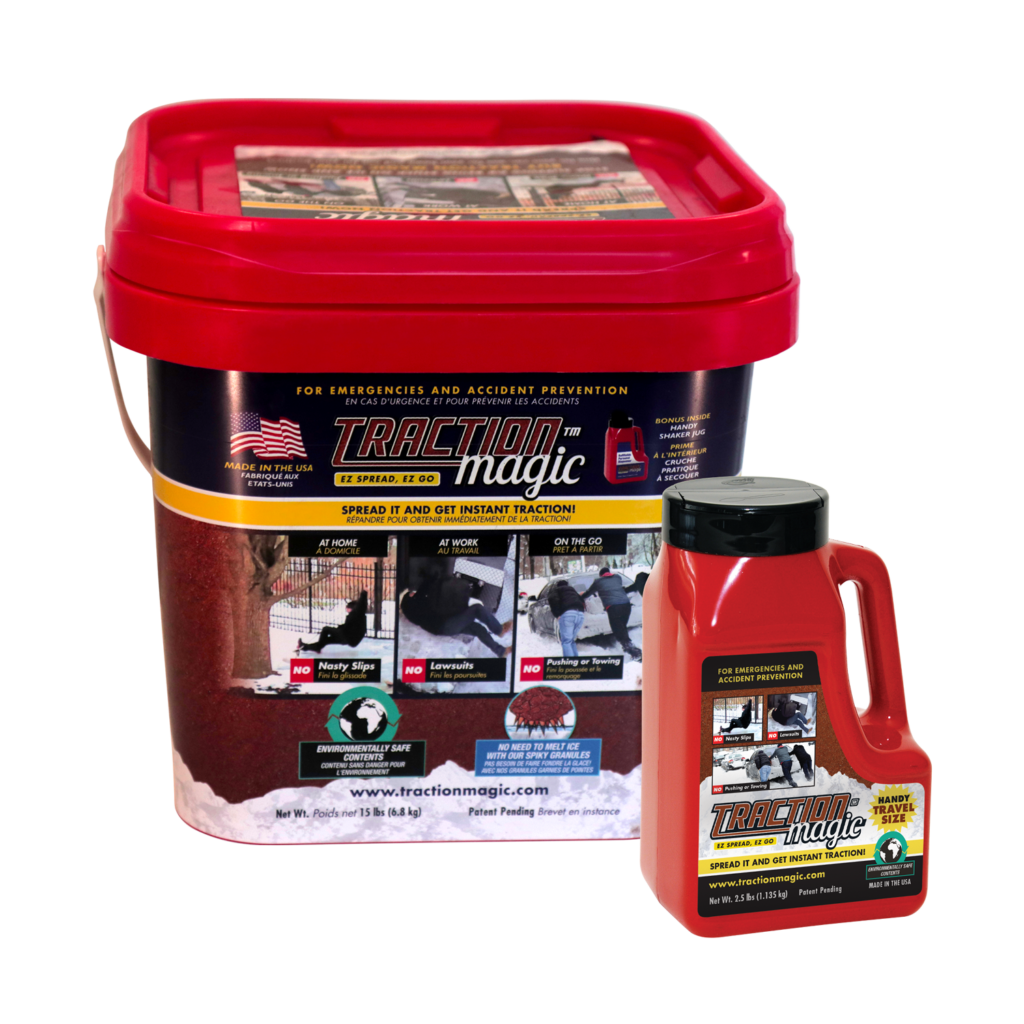
Walk On Ice
The handy disposable canister can be taken everywhere, with the same 100% naturally occurring minerals that provide instant traction on ice or snow. Use it on sidewalks, steps, or as an instant traction agent for your car.
